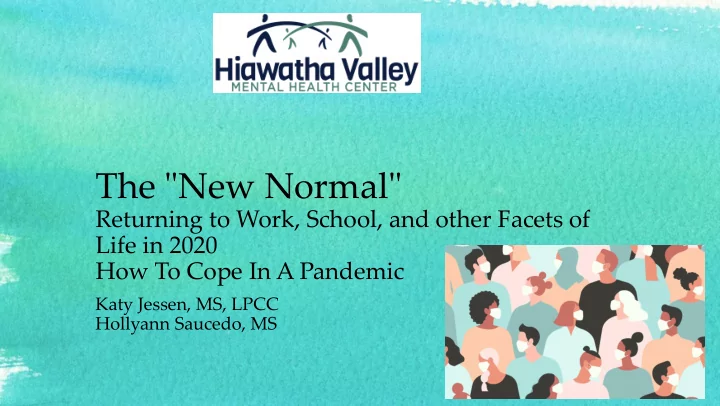

The "New Normal" Returning to Work, School, and other Facets of Life in 2020 How To Cope In A Pandemic Katy Jessen, MS, LPCC Hollyann Saucedo, MS
Disclaimer •During the presentation, the presenter(s) will be accepting questions. These can be submitted in the Q & A feature in Teams. •At Hiawatha Valley, we care about your mental wellness. If you are experiencing discomfort throughout this presentation or require crisis intervention, please use our crisis line to consult with a professional 1-844- CRISIS2
Overview/Objectives • How has COVID-19 impacted us as mental health professionals? • Pandemics can be stressful! • What will returning to school look like? • What will returning to work look like? What has it looked like? • Similarities with returning to work/school • Self-Care activities • Questions • Closing Activity
How has COVID-19 impacted us as mental health professionals? •Shift to telemedicine (pros and cons) •It's changed how we communicate/interact •Katy and Hollyann's thoughts/perspectives
Pandemics are stressful • Everyone reacts differently • Impact on sleep/eating habits, worsening of chronic health or mental health conditions, increased substance use • Increase fear/anxiety • Who is the most at-risk of a strong response to pandemic? • It is okay to not be okay! • Reference: • https://www.cdc.gov/coronavirus/2019-ncov/daily-life-coping/managing-stress- anxiety.html#stressful
Returning to school during COVID-19 •We all have questions/concerns (including school staff and teachers!) •Each school's plan will look different but will consider the best interest of everybody •Plans for schools, like the pandemic itself, are fluid, ever-changing!
Returning to school continued •Article from UNICEF: 'Supporting your child's mental health as they return to school during COVID-19' •School is stressful to begin with •Remind them of positives • Watch for signs of stress and anxiety • When in doubt, go with empathy and support
Keeping Schools Safe
Things to Keep in Mind on Returning to School • Mental health! • Watch for behavioral changes in kids • Take breaks from the news; talk about COVID-19 with your kids in language they can understand • Connect with others • Try to keep a routine • Make fun traditions to lessen anxiety and build memories
Self-Care Activity Every Day Every Week Every Month Every Year
Returning To Work • If you are transitioning back to the work-place you may have experienced the following: • Increased anxiety, stress or fear about returning • Feeling overwhelmed due to new safety protocols • Have gotten used to increased family time at home • Having the thought " Will I be safe?" • Stress due to figuring out childcare and school for children when you transition back • These are all valid experiences! You are not alone!
Returning To Work Stress and Symptoms Stress Causing Factors Symptoms of Stress • • Concern of exposure Feeling irritation, anger, or in denial • • Taking care of personal and family needs while Feeling uncertain, nervous, or anxious working • Lacking motivation • Managing a different workload • Feeling tired, overwhelmed, or burned out • Feelings that you are not contributing enough to work or guilt about not being on the frontline • Feeling sad or depressed • Uncertainty about the future of your workplace • Having trouble sleeping and/or employment • Having trouble concentrating • Learning new communication tools and dealing with technical difficulties • Adapting to a different workspace and/or work schedule Reference: https://www.cdc.gov/coronavirus/2019- ncov/community/mental-health-non-healthcare.html
Managing Job Stress and Building Resilience • Connect with others at your work-place – Communicate with co-worker, supervisors and employees to identify stress and work together to come up with a solution – Ask about resources for mental health • Create a routine to increase control and predictability – Make it similar to the one you had before the pandemic – Take breaks from work ( stretch, exercise or check in with others) – Add in outdoor time – Practice mindfulness – Do things you enjoy after work Reference: https://www.cdc.gov/coronavirus/2019- ncov/community/mental-health-non-healthcare.html
Managing Job Stress and Building Resilience cont. • Remind yourself everyone is in this unusual situation. • Take breaks from watching, reading, or listening to news stories, including social media. • Connect with others. Talk with people you trust about your concerns, how you are feeling, or how the pandemic is affecting you. • Connect with others through phone calls, email, text messages, mailing letters or cards, video chat, and social media. • Check on others. Helping others improves your sense of control, belonging, and self-esteem. Look for safe ways to offer social support to others. • Focus on what you can control. Reference: https://www.cdc.gov/coronavirus/2019- ncov/community/mental-health-non-healthcare.html
Activity • Take out a piece of paper- it can be any size • Draw one big circle and a smaller circle • Write what you can't control in the bigger circle • In the inner circle write what you can control
Back to Work and School Similarities • Both have individuals that may experience anxiety and fear • Plans keep on changing – both students and workers must be flexible • Keeping a consistent schedule/ routine is important • Staying connected with people and asking for resources is important • Taking breaks Resource: https://www.cdc.gov/coronavirus/2019-ncov/community/mental-health- non-healthcare.html
Questions • We will now be reviewing questions through the chat feature • If you have not done so, please ask any questions now
Ending on a Positive Note • Take a moment to think of one positive thing or one thing you have been grateful for through this pandemic • Use the chat feature and share it with us!
Thank You! • Thank you for listening! We hope you enjoyed this presentation and found it to be informative and helpful!
Recommend
More recommend